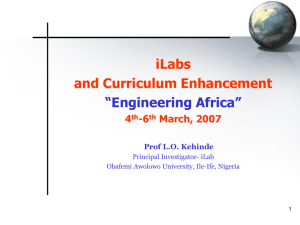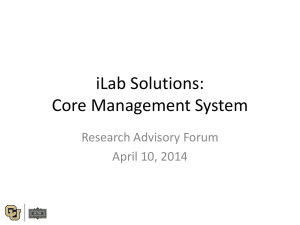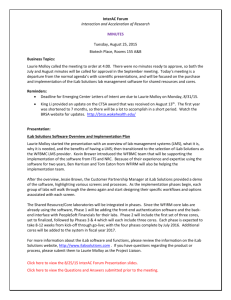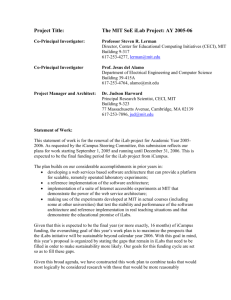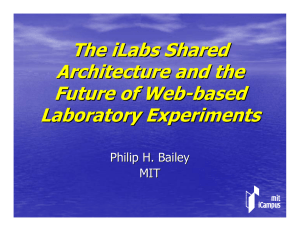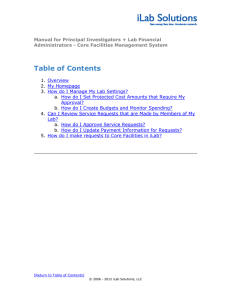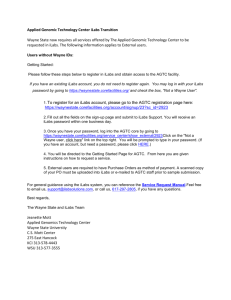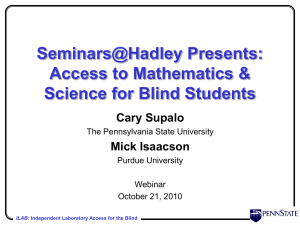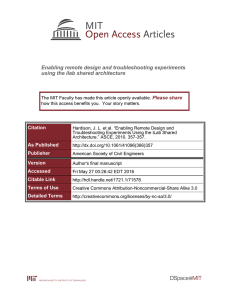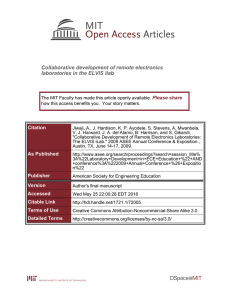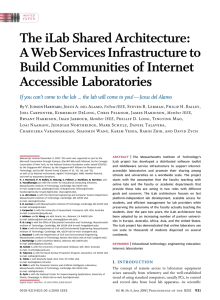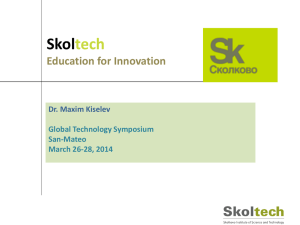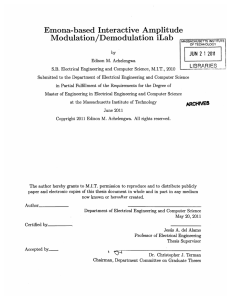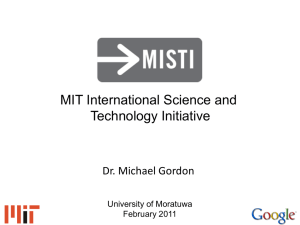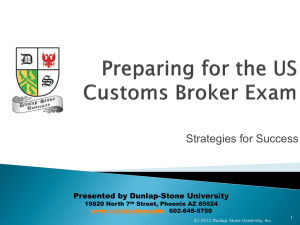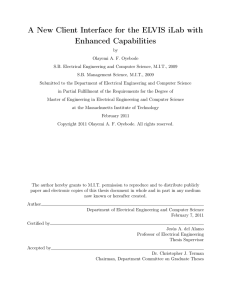The MIT iLab Architecture
advertisement
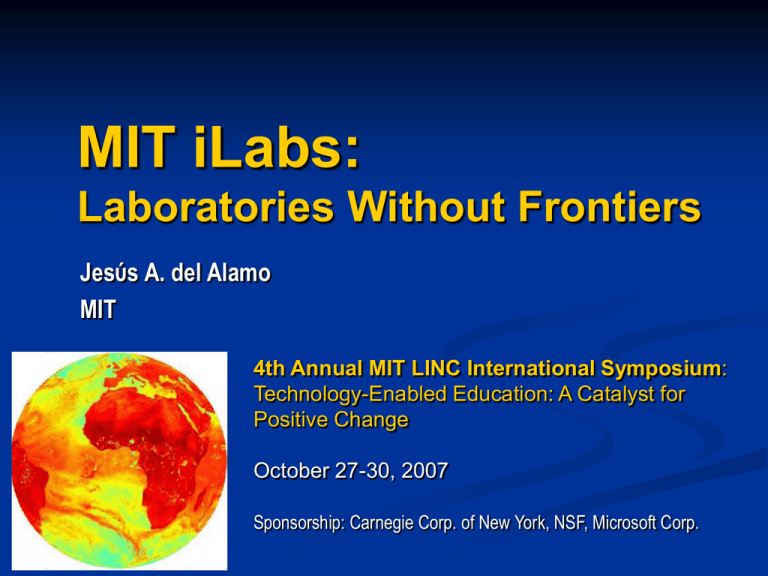
MIT iLabs: Laboratories Without Frontiers Jesύs A. del Alamo MIT 4th Annual MIT LINC International Symposium: Technology-Enabled Education: A Catalyst for Positive Change October 27-30, 2007 Sponsorship: Carnegie Corp. of New York, NSF, Microsoft Corp. Motivation to iLabs There is enormous educational value in hands-on laboratory experiences But, conventional labs… … are expensive and have complex logistics … can’t easily be shared iLabs: real laboratories that are accessed through the Internet from anywhere at any time 2 iLabs at MIT Polymer crystallization (Chem. E., deployed 2003) Dynamic signal analyzer (EECS, deployed 2004) Microelectronics device characterization (EECS, deployed 1998) Shake table (Civil Eng., deployed 2004) ELVIS (EECS, deployed 2006) Heat exchanger (Chem. E., deployed 2001) 3 Microelectronics Device Characterization iLab 4 Typical Assignment Transistor characterization project: Measure transistor characteristics Extract transistor parameters Compare measurements with class models Also, do whatever else you want with the transistor… 5 iLab Capacity Oct. 13-20, 2000 Oct. students) 13-20, 2000 (~100 (~100 students) • When do students carry out their assignment? • What is the lab system capacity? exercise out on Friday exercise due on Friday 6 iLab Capacity Oct. 13-20, 2000 (~100 students) exercise out on Friday exercise due on Friday System capacity: > 2,000 users/week > 15,000 experiments/week 7 iLab Use 1400 non-MIT MIT graduate MIT undergraduate 1200 # Students 1000 800 over 5400 student users (for credit) since 1998 from 4 different continents 600 400 200 0 1998 1999 2000 2001 2002 Year 2003 2004 2005 2006 8 iLab: the Opportunities Order of magnitude more laboratories available to our students Unique labs: Rich pedagogical experiences: Unusual locations, expensive equipment, rare materials More lab time available to students GUI to lab integrating graphing, simulation, collaboration, tutoring Worldwide communities of scholars created around labs sharing content 9 iLab: the Challenges Developing an iLab from scratch is a lot of work! Managing a broadly shared iLab is also a lot of work! Great attention needed to user scalability Needs to be done by domain specialist Disincentive for owner to share lab Key challenge: iLab Scalability 10 The MIT iLab Architecture Campus network Client Internet Service Broker Lab Server Three tier architecture: Lab Server: brings experimental setup online Client: GUI to lab Service Broker: Serves GUI, mediates between Client and Lab Server Performs generic functions (user management, data storage) 11 The MIT iLab Architecture Campus network Client Internet Service Broker Lab Server Development responsibilities: Lab Server, Client: Educator heavily involved in development Registered with Service Brokers around World Service Broker: Developed by MIT, open source Has well defined software interfaces 12 The MIT iLab Architecture Campus network Client Internet Service Broker Lab Server Management responsibilities: Lab management (i.e. lab policy): performed by lab provider User management performed at Service Broker: User registration, authentication User data storage and archiving Responsibility of user’s institution 13 Unique Issues for iLabs in developing countries Opportunities: Paucity of labs Great need for engineers Challenges: Limited access to networked computers and educational software tools Limited appreciation of versatility of computer Severe bandwidth limitations 14 Bandwidth limitations (example: Makerere University, Kampala) campus wide single-mode optical fiber (2 Gb/s) satellite gateway to Internet metropolitan network (total campus bandwidth=21 Mb/s) academic buildings networked at 10/100 Mb/s For comparison, MIT’s bandwidth is 8 Gb/s (all data for Nov. 2006) 15 World Submarine Optical Fiber Systems • Limited reach of optical fiber systems • Limited national networks • Similar problems in other regions in the World 16 Consequences for iLabs (and other rich educational resources) Need to deploy educational resources locally Solutions engineered in the developed world not necessarily effective across digital divide need to engage developing countries in educational technology innovation Pedagogy likely to be different in bandwidth starved situations need to be ready to experiment and modify 17 Local Service Brokers Installed at OAU, MUK and UDSM applet delivered by local service broker student results stored locally Average Applet download time at OAU reduced from 79” to 22” 18 iLab development in Africa OAU Opamp iLab Kayode Ayodele (OAU, Nigeria) 19 SustainabilityThe iLab Consortium Need for an iLab Consortium: Higher Ed to create an efficient market place for sharing and trading access to iLabs Commerce & Industry K-12 to support communities of scholars created around iLabs to lead evolution of iLab Architecture Foundation, Non-Profit & Government 20 Conclusions iLabs will enhance science and engineering education iLabs and their educational content will be broadly shared around the world iLabs can provide a path for the developed world to support education in the developing world iLab Architecture: scalable framework to support iLab dissemination around the world 21 “If You Can’t Come to the Lab… the Lab Will Come to You!” (Earth at 89 GHz; courtesy of J. Grahn, Chalmers U.)
